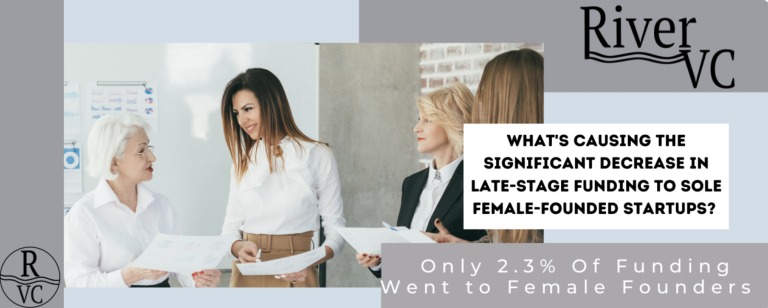What’s causing the significant decrease in late-stage funding to sole female-founded startups? originally posted here
There’s been a significant decrease in late-stage funding to sole female-founded startups. This begs the question: what do you think caused this decrease? The data is clear: there has been a significant decrease in late-stage funding to sole female-founded startups in the last few years.
What could be causing this sudden and concerning drop in late stage funding for female led startups? While there is no one answer to this question, it’s important that we ask it and try to find some solutions. There are a number of possible explanations for this trend. One possibility is that VC firms are becoming increasingly risk-averse and are therefore less likely to invest in companies with a single founder, regardless of gender. Or that that venture capitalists are simply not seeing as much potential in female led businesses as they used to Another possibility is that male founders are better at networking and raising capital than their female counterparts. Or those who are seeking funds are not being taken seriously by investors.
We need to take a close look at this problem and find ways to fix it. Female entrepreneurs are just as capable as their male counterparts, and they deserve an equal chance at success. In their article for Fundera on Women-Owned Businesses: Statistics and Overview (2021) by
Maddie Shepherd it shows that “Private tech companies led by women achieve 35% higher ROI and Women-founded companies in First Round Capital’s portfolio outperformed companies founded by men by 63%.” which demonstrates that female led business are outperforming their male counterparts.
You can read the full stats here

With more women in leadership positions, we can create a more balanced and innovative business world. We need to work together to make sure that late-stage funding for female-founded startups becomes a priority again.
Only then can we create a level playing field for all entrepreneurs.
In their article for TechCrunch “Why arent female founders getting a bigger piece of the pie theories abound? by Anita Ramaswamy states Less than 2% of venture capital funding went to all-female founding teams in 2021, marking a five-year low, new data from PitchBook shows.
You can read the full article here

In their article for Harvard Business review Women-Led Startups Received Just 2.3% of VC Funding in 2020 by Ashley Bittner and Brigette Lau they state: “The percentage of VC deals that went to female-led startups declined in 2020. This development, which comes as women are leaving the U.S. workforce in droves, is especially bad news. Research shows many positive things occur when VCs choose to fund women, and investors must take conscious steps to increase funding for this underrepresented group of entrepreneurs.”
You can read the full article here
With so much emphasis on reaching parity and governments and businesses globally debating the need and committing to make the changes needed to increase the level of funding it begs the question could this lack of parity be influenced by unconscious bias?

In their article for Harvard Business Review Male and Female Entrepreneurs Get Asked Different Questions by VCs — and It Affects How Much Funding They Get by Dana Kanze, Laura Huang, Mark A. Conley, and E. Tory Higgins
“A study of Q&A interactions between venture capitalists and entrepreneurs at the annual startup funding competition TechCrunch Disrupt New York City found that venture capitalists posed different types of questions to male versus female entrepreneurs. They tended to ask men (promotion) questions about the potential for gains, and they tended to ask women (prevention) questions about the potential for losses. The difference in questioning explains much of why female entrepreneurs received five times less funding than their male counterparts.”
It also states”A second experiment finds that the relationship between Q&A orientation and funding is causal. Entrepreneurs who were asked promotion questions received twice as much funding as those who were asked prevention questions.”
And concludes “Both studies also revealed an actionable silver lining: If entrepreneurs reframe their responses to prevention questions, they may be able to raise more funds.”
You can read the full article here
It’s time for us to take a stand and make sure that female entrepreneurs are getting the late-stage funding they need and deserve. We need to work together to fix this problem so that we can create a level playing field for all entrepreneurs. With more women in leadership positions, we can create a more balanced and innovative business world.
What do you think is the best way to increase late-stage funding for women-led startups? Let us know in the comments below!
Do you have a female-founded startup that’s in need of funding or you’re an investor interested in supporting female entrepreneurs, please contact us. We’d love to chat with you about how we can work together.
Find out more about Stephanie and subscribe to Navigating the Waters

Stephanie McKinney
CEO and Founder of River VC
Email: smckinney@river-vc.com
Website: River VC
Instagram: @rivervcllc
Twitter: @rivervcllc
LinkedIn: Stephanie McKinney
Youtube: Navigating the Waters
If you enjoyed it please check out our YouTube or our recent blog or subscribe to our Mastermindset Newsletter

